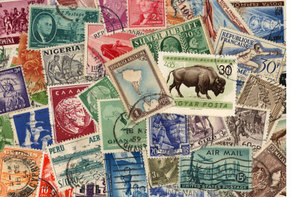
More than 25% of the entire population of the world has collected stamps at one time in their life.
Whether you believe that statistic or not, stamp collecting has been a hobby passed down from parent to child and a way that millions of children have learned about the world. I admit, I collected stamps as a kid. In fact, the first place I learned the Sverige was Sweden, Magyar meant Hungary, and how to spell India in Hindi was from stamps. It was a way of travelling around the world while staying put, learning about obscure countries that seemed made up (seriously, is there really a Leichenstein?) and surprisingly, it also turned out to be a way I learned about business. My brother and I used to check out the stamp pricing guide from the library and be amazed at how much we were worth. Along with my Topps Art Monk rookie NFL card, my total net worth was more than $50 before I hit the age of ten. Thankfully, I’ve nearly doubled it since then …
But jokes aside, what is the power of stamp collecting that drives countries around the world to still use stamps as a key marketing tool for their countries? In some small countries, the revenues from printing the selling their stamps to collectors around the world is a significant source of income. It’s like printing your own money, almost. Here are a few reasons why I think stamp collecting has remained such a popular activity:
- Captures the moment – Stamps are all limited issue, and when you get them with a postmark, they very clearly capture a singular moment in time. Because of this, they feel like a historical record. In fact, many stamps are even called "commemorative." The stamps I picked up in Peru are different to the ones you would get if you went a few months from now. That makes my collection unique.
- Offers a global universality – Just about every country has postage and mail, and therefore every one has stamps. You may not find shot glasses or little spoons, or all the other things people collect in every country, but you will always be able to get stamps.
- Has a real value – Every stamp has a real value associated with it, and is usually worth more over time. When you buy one, the amount you paid is usually printed on it. The value is therefore very obvious, and makes it feel significant. You might throw away other souveniers or things you pick up while travelling, but few people ever throw away a stamp. It just feels like throwing away money.
- Always changing – Every year, countries issue many different designs of stamps. More recently, these stamps mirror recent events, are released in interesting sets and come in all shapes and sizes. As a result, there is plenty of variety. Stamps are colorful, plentiful and always different.
Next time you pass a post office in any country, pay attention to how they are using their philately to promote the country, cater to tourists, or commemorate moments of significance. People there don’t send that much mail. The stamps are just a smart hook that makes sense because it offers something unique to travelers. It’s no wonder at least everyone’s tried it at least once.






WE RECENTLY REMOVED COMMENTING - LEARN WHY HERE >